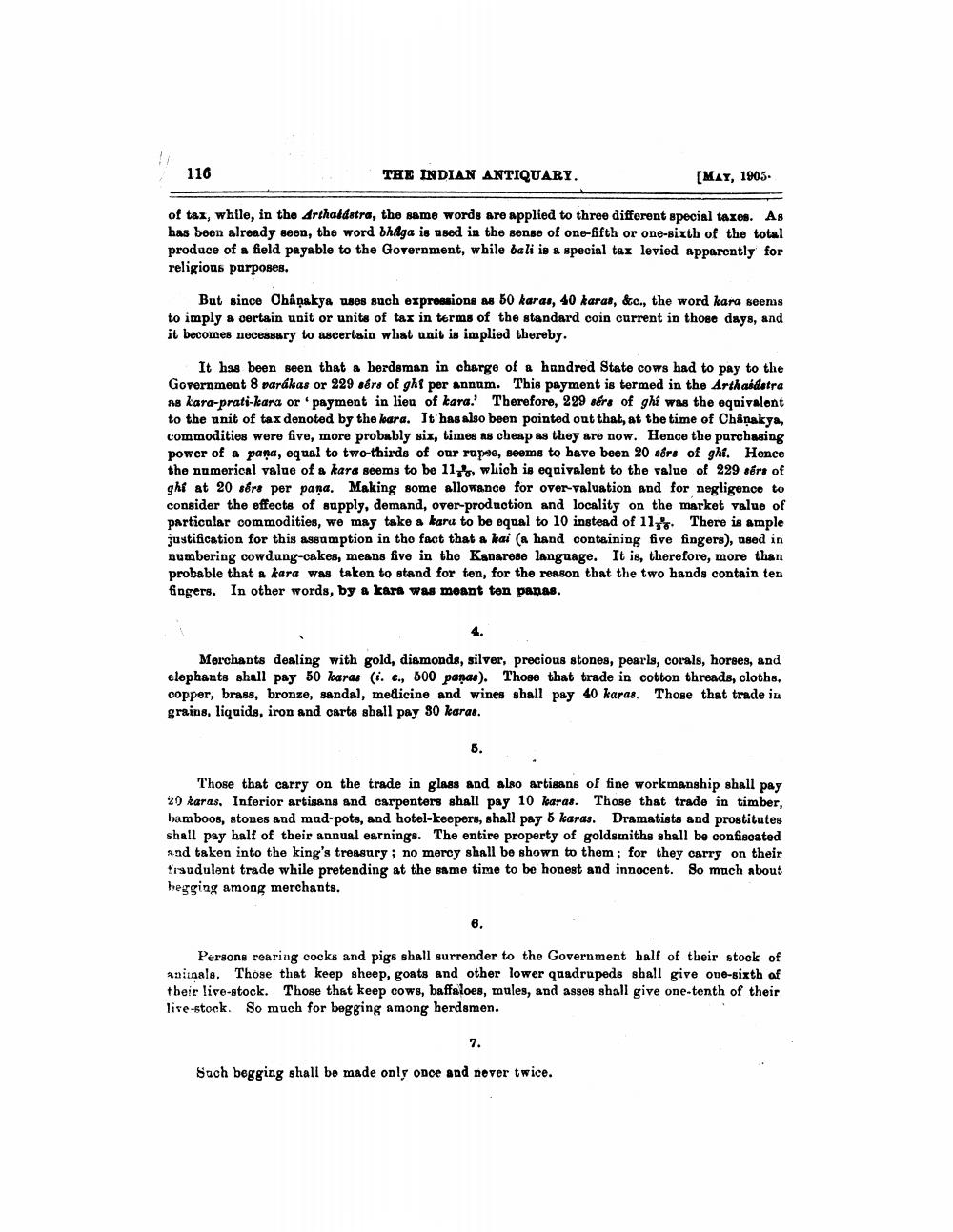________________
116
THE INDIAN ANTIQUARY.
[MAY, 1905.
of tax, while, in the Arthaldatra, the same words are applied to three different special taxes. As has been already seen, the word bhaga is used in the sense of one-fifth or one-Birth of the total produce of a field payable to the Government, while bali is a special tax levied apparently for religious purposes.
But since Châņakya uses such expressions as 50 karas, 40 karas, &c., the word kara seenis to imply a certain upit or units of tax in terms of the standard coin current in those days, and it becomes necessary to ascertain what unit is implied thereby.
It has been seen that a herdsman in charge of a handred State cows had to pay to the Government 8 varákas or 229 sérs of ghi per annum. This payment is termed in the Arthasdatra 18 kara-prati-kara or payment in lieu of kara. Therefore, 229 sérs of ghi was the equivalent to the unit of tax denoted by the kara. It has also been pointed out that, at the time of Chanakya, commodities were five, more probably six, times as cheap as they are now. Hence the purchasing power of a pana, equal to two-thirds of our rappe, seems to have been 20 sérs of ghi. Hence the numerical value of a kara seems to be 11,7, wlich is equivalent to the value of 229 sers of ghi at 20 sérs per paņa. Making some allowance for over-valuation and for negligence to consider the effects of supply, demand, over-production and locality on the market value of particolar commodities, we may take a karu to be equal to 10 instead of 116. There is ample justification for this assumption in the fact that a kai a hand containing five fingers), used in numbering cowdang-cakes, means five in the Kaparese language. It is, therefore, more than probable that a kara was taken to stand for ten, for the reason that the two hands contain ten fingers. In other words, by a kara was meant ton panas.
Merchants dealing with gold, diamonds, silver, precious stones, pearls, corals, horees, and elephants shall pay 50 karas i. e., 500 paņas). Those that trade in cotton threads, cloths, copper, brass, bronze, sandal, medicine and wines shall pay 40 karas. Those that trade in grains, liquids, iron and carts shall pay 80 karas.
Those that carry on the trade in glass and also artisans of fine workmanship shall pay 20 karas, Inferior artisans and carpenters shall pay 10 karas. Those that trade in timber, bamboos, stones and mad-pots, and hotel-keepers, shall pay 5 karas. Dramatists and prostitutes shall pay half of their annual earnings. The entire property of goldsmiths shall be confiscated and taken into the king's treasury; no mercy shall be shown to them; for they carry on their fraudulent trade while pretending at the same time to be honest and innocent. So much about hegging among merchants.
Persona rearing cocks and pigs shall surrender to the Government balf of their stock of taitaals. Those that keep sheep, goats and other lower quadrupeds shall give one-sixth of their live-stock. Those that keep cows, baffaloes, mules, and asses shall give one-tenth of their lise-stock. So much for begging among herdsmen.
Such begging shall be made only once and never twice.




